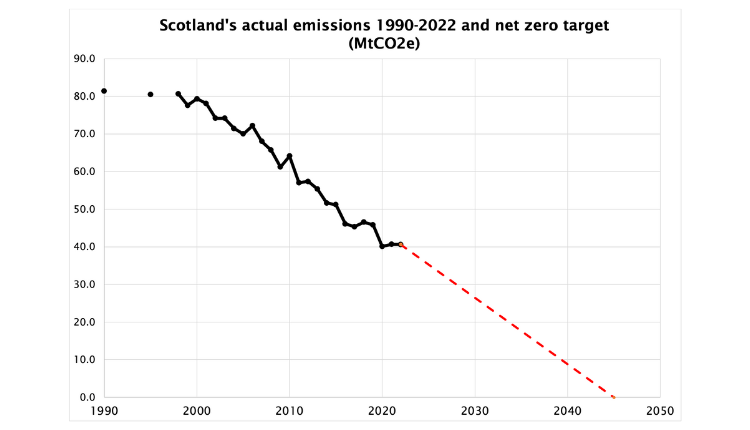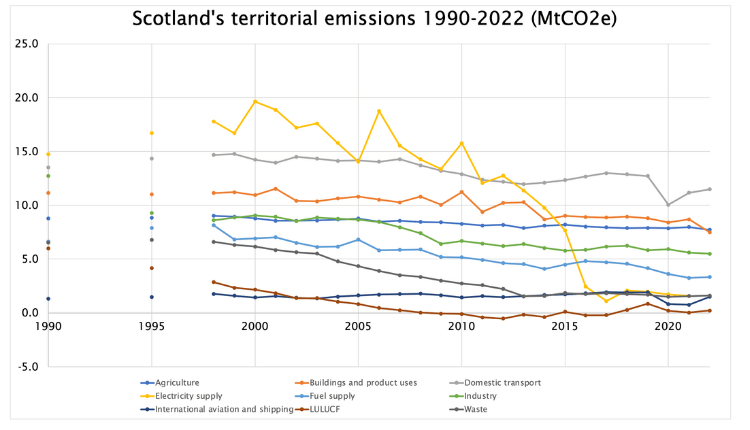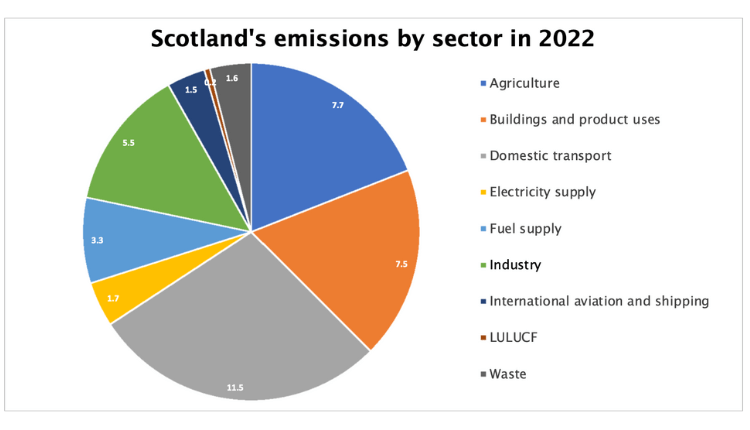Introduction
This climate manifesto of policy proposals has been drawn together from across the Stop Climate Chaos Scotland coalition’s 70+ diverse members, with additional input from other Scottish groups and networks. The document’s ambition is shared by every SCCS member, large and small, and it represents the most comprehensive set of climate change policies ever assembled by civil society in Scotland.
Adopting the policies in this document would put Scotland on track to deliver the real reductions in climate change that the planet needs and to make our fair contribution to helping other countries deal with climate change in their own ways.
The Scottish Government has acknowledged the twin climate change and nature emergencies. In the last 15 years the Scottish Parliament has passed two climate acts, both with tough emissions reduction targets and the Scottish Government has called this time – the 2020s – the ‘decade of delivery’ on climate change1. The Climate Justice Fund has also been helping people in Malawi, Rwanda and Zambia to adapt to the changing climate for more than a decade, and now seeks to support action to address the losses and damages created as a consequence of rising temperatures.
But, on too many fronts, we are not delivering at anywhere near the speed or depth required. The Scottish Government’s own monitoring shows we are off track for our 2045 target, with less than half of all their outcome indicators definitively on track.
The world has but little time to avoid the worst consequences of climate change, with increasingly devastating fires, floods, droughts and storms across the globe.
The World Meteorological Organisation recently warned that the world is likely to breach the crucial 1.5ºC temperature threshold, albeit temporarily, in the next few years.
The 2023 IPCC Synthesis Report stressed the rapidly closing window of opportunity to keep the world below the 1.5ºC threshold of the most dangerous levels of heating. The UN Secretary General António Guterres said we need to do “everything, everywhere, all at once” to reduce emissions, and called for all developed economies to aim for net zero by as close as possible to 2040.
Scotland’s actual emissions 1990-2022 and net zero target (MtCO2e)
 Figure 2: Scotland’s greenhouse gas emissions as reported up to 2022 and our 2045 net zero target from the 2019 Climate Act, Scottish Greenhouse Gas Statistics 2022 https://www.gov.scot/publications/scottish-greenhouse-gas-statistics-2022/
Figure 2: Scotland’s greenhouse gas emissions as reported up to 2022 and our 2045 net zero target from the 2019 Climate Act, Scottish Greenhouse Gas Statistics 2022 https://www.gov.scot/publications/scottish-greenhouse-gas-statistics-2022/
All countries, but particularly rich, industrialised nations who caused and continue to deepen the climate crisis, must do more to limit temperature rises, and the damage they create – every fraction of a degree of warming will be counted in lives ruined or lost.
Scotland must rebuild its once strong international reputation on climate change and play its full part in this global effort. But to do so from a position of credibility, Scotland needs to do much more – more to deliver on what has already been promised and more to increase our ambition further. It must confront this challenge in ways that realise its commitments to climate justice – justice for those impacted by the damage our emissions are creating, and justice in the way we reduce our emissions, including protecting those on low incomes and making polluters pay for their pollution.
Ensuring delivery of domestic commitments needs faster and stronger activity under the existing plans. Our plans should also link the Scottish Government’s work on domestic and international issues, providing a comprehensive and credible policy platform on climate change, as well as addressing the climate impacts of our imports and exports. In driving a Just Transition away from fossil fuels, Scotland must make sure that policies and programmes simultaneously address poverty and inequality, in Scotland and overseas. After all, the climate crisis is caused by inequality; it’s causing more inequality; and the response to it could – if not purposefully designed to be just and equitable – entrench inequality. As well as protecting us from some of the challenges a changing climate brings, adopting these policies would also help create jobs, boost the economy and make our society fairer and healthier.

Figure 3: historical emissions from activity in Scotland by sector plus international aviation and shipping, in millions of tonnes of carbon dioxide equivalent (MtCO2e), Scottish Greenhouse Gas Statistics 2022 https://www.gov.scot/publications/scottish-greenhouse-gas-statistics-2022/
 Figure 4: the sources of Scotland’s emissions in 2022
Figure 4: the sources of Scotland’s emissions in 2022
Early and extensive public engagement is essential to communicate the benefits of climate action and ensure that new policies are understood and well received.
These proposals are not motivated by dogma: they are instead driven by the need to confront an existential threat in ways that address the deep injustices at the heart of this crisis.
We urge decision makers at every level to support the policies in this document so that, together, we can address the climate emergency with the urgency it requires.
Cabinet Secretary Michael Matheson at launch of Energy Strategy and Just Transition Plan at COP26, November 2021.

